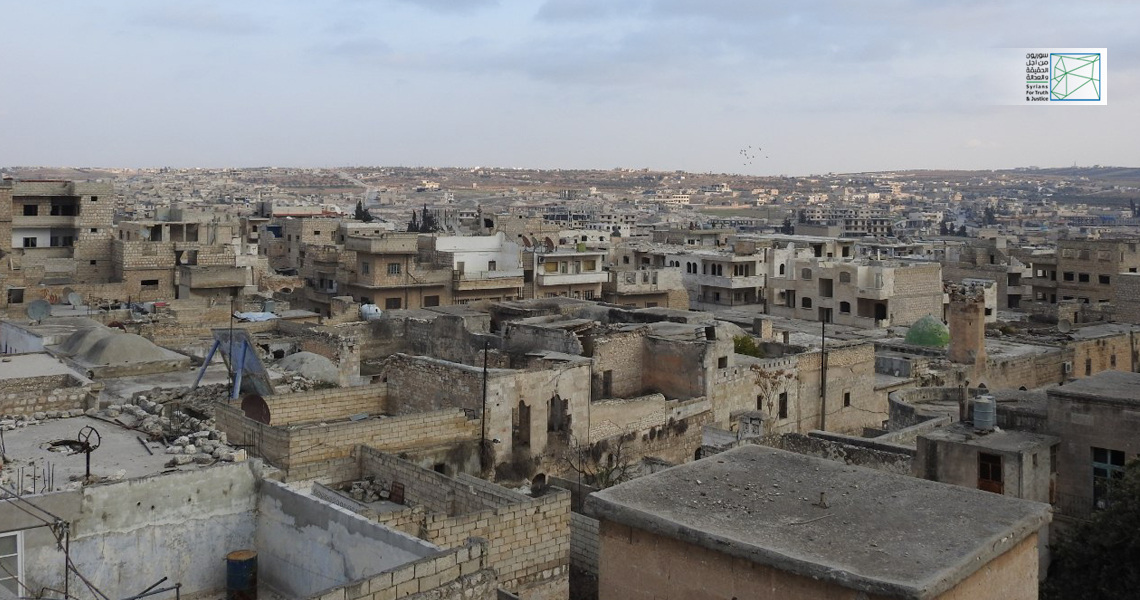In August and December 2018, a Sharia Court and a Sharia Arbitral Tribunal in the region of Maarrat al-Nu'man, southern Idlib, and northern rural Hama brought four persons, sentenced to death, before a firing squad, and passed two similar death sentences, however, in absentia, against two persons convicted of murder. The mentioned courts assigned the enforcement of the sentences they passed, based on the convicts’ confessions, to a number of armed opposition groups. Covering these incidents, Syrians for Truth and Justice/STJ obtained testimonies about the executions and the cases related to them.
The death sentences were passed by the Islamic Judiciary Committee/ Maarrat al-Nu'man Court and a Sharia Arbitral Tribunal, constituted particularly to address a single case of murder in northern rural Hama. STJ’s field researchers spoke to several of the victims’ relatives, a former judge of a sharia court, a register and one of the military commanders of the Jaysh al-Izza/Army of Glory, which enforced one of the death sentences. In addition to this, STJ was acquainted with the cases’ transcripts and the sentences passed by these courts. Below, it will also explain the basis of these courts’ foundation and the laws they rely on to pass sentences.
It should be noted that the Islamic Judiciary Committee/ Maarrat al-Nu'man Court was founded late in 2016, and the judges operating under it are either civilians or affiliates of Harakat Ahrar al-Sham al-Islamiyya. The court’s executive force, nonetheless, is derived from the Maarrat al-Nu'man Military Council, which consists of several armed groups, most importantly Ahrar al-Sham, al-Sham Legion and Suqour al-Sham/ Sham Falcons Brigades.
The Tramla Sharia Court was founded in 2014, and, similarly, it consists of judges that are either civilians or affiliates of Ahrar al-Sham.
Presiding over criminal and personal status cases, both of the courts hinge their sentences on the provisions of Islamic sharia, the sole source of legislation they recognize while acknowledging none of the positive laws.
The above-mentioned armed groups put the sentences, passed by these two courts, into force, while that passed by the Sharia Arbitral Tribunal, northern rural Hama, was enforced by the Jaysh al-Izza.
Starting from January 20, 2019, the military groups ceased to operate in the full range of the mentioned regions, and these courts are, today, directly bound to Hayat Tahrir al-Sham/HTS, STJ’s field researcher reported.
I. The Execution of Luqman Awad al-Youssef: Sentenced to Death by the Sharia Arbitral Tribunal and Put to Death by Jaysh al-Izza
On September 10, 2018, the Sharia Arbitral Tribunal, consisting of five faith leaders/ religious scholars/sheiks and agreed upon by the relatives of the murdered person and the murder, passed a final non-appealable death sentence against the civilian Luqman Awad al-Youssef. The sentence was enforced by the Jaysh al-Izza armed group on the 23rd of November, 2018, following al-Youssef’s confession of murdering the civilian Medhat al-Salmou on August 20, 2018.
1- The Incident’s Details:
STJ’s field researcher spoke to Muneer al-Salmou, the brother of Medhat al-Salmou, the murdered civilian, who narrated the details the murder:
“My brother was a car dealer, along with his partner Luqman, who asked my brother to sell him a number of cars for a sum of money amounting to $12,000, which he will be paying on a defined date. The time came, and Medhat started to demand the money of Luqman. However, the latter kept procrastinating and delaying the matter. On August 20, 2018, Luqman called Medhat and told him that he had some of the money, $2000, and asked him to show up at his house to get it. My brother drove his car to Luqman’s house, located in the city of Kafr Zita.
Reaching the house, Luqman said that the money is with a friend of his, based near the agricultural lands in the city’s suburbs. They both boarded the car. When they arrived in a land, away from the city, Luqman pretended the need to pass water. They both got off the car. It was then when Luqman headed towards Medhat and put an 8.5 caliber bullet to his head, from the gun he possessed. He stole Medhat’s cellphone and 200 Syrian pounds he had. And then, he threw him down a nearby well and left the place. The following day, a civilian saw the traces of the incident and reported to the security service of the Jaysh al-Izza, which controls the region. Investigating the matter, Luqman was arrested and confessed the incident.”
2- The Formation of the Sharia Tribunal, Passing the Sentence and Implementing it:
Muneer al-Salmou, the murdered person’s brother, added:
“Luqman’s family and mine agreed upon founding a Sharia Tribunal, consisting of five sheiks, known for their independence and non-affiliation to any military side, as to preside over the case and make a judgment. They agreed to assign Mohammad al-Nu’man, Abdulhalim Hamweyeh, Abdulkafi al-Saleh, Khalid al-Hussein and Ibrahim Darwish [as judges]. The tribunal passed the sentence and Jaysh al-Izza implemented it at one of its military headquarters.”
The sentence was passed on September 10, 2018, and was enforced by Jaysh al-Izza on November 23, 2018, for the Sharia Tribunal had granted Luqman al-Youssef a period of time to meet his financial obligations and sort out his pending issues.
Concerning the implementation of the death sentence, STJ’s field researcher also spoke to a military commander of the Jaysh al-Izza, who said:
“We enforced the sentence at the request of the Sharia Tribunal, assigned to address the case. This was the only time we implement such a sentence.”
STJ’s field researcher for the region pointed out that the locals prefer that an armed group implement the death sentence, passed by sharia courts and tribunals, instead of the murdered person’s family, as to avoid any futuristic vengeful acts and to guarantee the end of any disputes that may arise between the families.
The researcher added that the formation of sharia tribunals to address the cases and disputes of northern rural Hama’s people is just rare, for their affairs are usually presided over by the Tramla Sharia Court, under the Ariha Court, which Harakat Ahrar al-Sham al-Islamiyya used to provide with executive force prior to its recent affiliation to HTS.
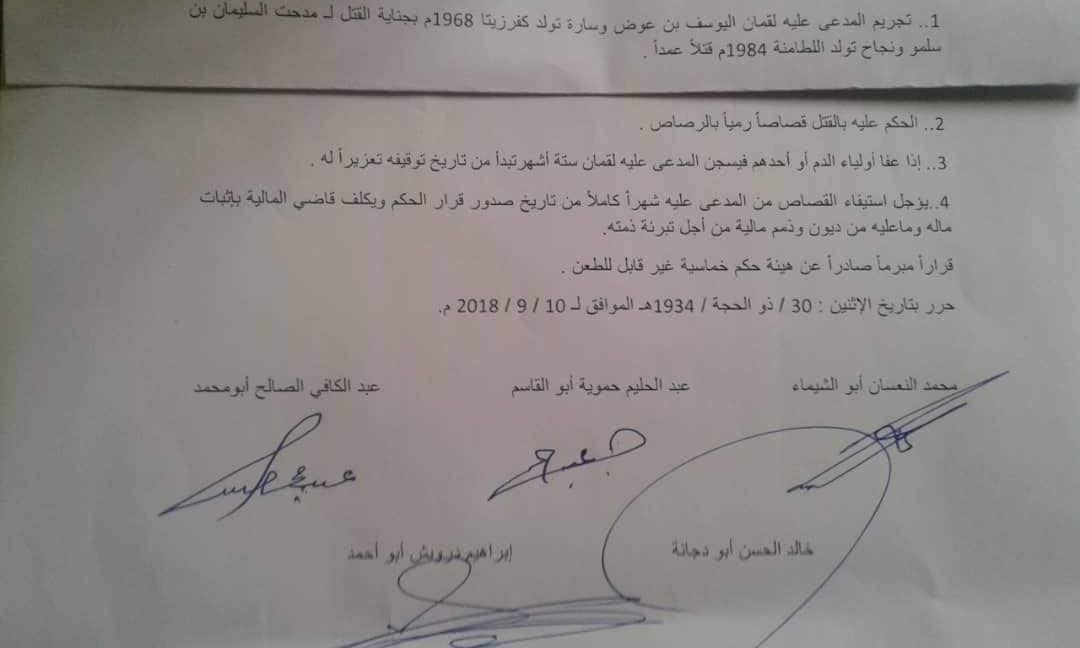
A copy of the death sentence passed against Luqman al-Youssef, signed by the members of the Sharia Arbitral Tribunal. Photo credit: The brother of Medhat al-Salmou, the murdered civilian.
3-The Tramla Sharia Court and the Death Sentences it Passed:
STJ’s field researcher also interviewed a former judge of the Tramla Sharia Court, who refusing to reveal his name for security considerations, said the following:
“The Tramla Sharia Court passes 3 to 6 death sentences a year, against convicts of murder cases. The sentence is usually based on the confession of the murderer or the group of murders and after lengthy deliberations with the relatives of the murdered persons, attempting to convince them of accepting a ransom or the [request for] pardon. The court derives its rulings from the Islamic sharia. Six persons operate under it and are of varied backgrounds; they are either judges who defected from the regime or scholars with Bachelor’s and Master’s degrees, and others who have graduated from Sharia institutes, such as al-Azhar.”
It is worth mentioning that the interviewed judge had recently left his position under the Tramla Sharia Court, after HTS took over the area, and that he functioned under the court for a single year, for he started late in 2017.
II. The Execution of Four Young Men: Sentenced to Death by the Islamic Judiciary Committee and Put to Death by Four Armed Groups:
The Maarrat al-Nu'man Court, affiliated with the Islamic Judiciary Committee, the principal headquarters of which is in the town of Binnish, enforced the death sentences passed against Abdulkareem Marwan al-Deeban, a 19-year-old young man, and Tarek Thabet Wassouf, an 18-year-old young man, on October 1, 2018, as well as Zaineddin Wassouf, an 18-year-old young man, on December 24, 2018, in addition to two death sentences which have not been enforced against two male escapees, Mohammad Malaikeh, a 22-year-old, and a person dubbed Abu Khalid, a 25-year-old, neither his name nor his shape are known to the court. All the persons mentioned are convicted of murdering the two young men Obaid Rashed al-Wassouf, a 28-year-old, and Shuhadeh Rashed al-Wassouf, a 26-year-old, whose murder took place on February 21, 2018.
1-The Incident’s Details:
STJ’s field researcher spoke to Rashed al-Wassouf, the father of Shuhadeh and Obaid, the two murdered young men. He narrated the details of the incidents:
“On February 21, 2018, both Shuhadeh and Obaid headed to their work at 10 am, as they have a passenger vehicle, after Obaid received a phone call. The caller, who I did not recognize, asked him to go to the Jisr al-Shughur-Ariha Highway to transport the caller and his daughters to the region of Harem. My sons boarded the vehicle immediately and drove to the mentioned location. In the afternoon, on the same day, we were informed that Obaid and Shuhadeh were both murdered near the city of al-Bala’a in the al-Roj Plain, Jisr al-Shughur. We found their bodies abandoned on the ground and drenched in blood. The following day, during the burial service I noticed that my fraternal nephew, Tarek, was crying his heart out; he was wailing though he has returned to the village only lately, after years of absence, for he pledged loyalty to Deash,[1] along with his brother who did not attend the service, as he left to Darkush in the morning. We have, at the same time, posted a photo of the vehicle which my sons boarded onto social networking sites. A person called me to tell me that the car was in the town of Maarzita, southern Idlib. We immediately headed to the location he mentioned, only to find out that the caller himself has recently returned from the areas held by Daesh. Asking him why he had the car and telling him that it belonged to my two murdered sons, he first answered that he bought it, and then said that a person has placed it in his possession. After a session of more than two hours, Tarek and Zain, my fraternal nephews admitted placing the car in his possession after they killed two anti-Daesh persons. They asked him to sell the car, relying on the close bond they had, which dates back to the time they spent together under Daesh.”
Rashed added:
“Going through all this, I asked my brothers, the fathers of the two murderers to surrender or bring Tarek and Zain to a session that will bring together all the family members. They actually brought them, and we secretly recorded the session. Tarek admitted his crime and we instantly gave him into the security committee. I also filed a complaint against them on the charge of murder to the Maarrat al-Nu'man Court. Abdulkareem, however, was arrested by the security committee on the same day, while it arrested Zaineddin al-Wssouf a few months later.”
2-The Course of Investigation and the Ruling:
STJ’s field researcher also met Abu al-Alaa, an employee at the Maarrat al-Nu'man Court’s register, where he works as a clerk of the court. He pointed out to the course of the case’s investigation:
“The Security Detachment of the Harakat Ahrar al-Sham al-Islamiyya transferred the murder case of Obaid and Shuhade al-Wassouf to the Maarrat al-Nu'man Court, for the Detachment had already run an investigation, under which both Tarek and Zain al-Wassouf, as well as Abdulkareem al-Deeban and Mohammad al-Malaikeh were convicted of the crime. The Court, upon investigating the background of the defendants, reached the conclusion that they are all fresh returnees from Daesh’s control areas, for all of them where in the area of Uqayribat, northern rural Hama, after they passed three years in the ranks of Daesh.
The father of the two murdered young men filed a complaint to the court 10 days after the murder’s day. On April 10, 2018, the Court issued an official letter to the security detachments to prosecute and arrest the defendants, whose names have been mentioned above. Abdulkareem and Tarek were arrested. After six sessions of investigations, they admitted murdering the two young men because they insulated the [Islamic] State/IS and offended it. The two offenders said that they were ordered to kill all those they suspect as being enemies of the State, and that they have the right to murder them and rob them of their money. On October 1, 2018, following the six investigation sessions, a sentence to death was passed, and both Tarek and Abdulkareem were executed on the same day. Zain was prosecuted and put to death on December 24, 2018, while Mohammad Malaikeh and a person called Abu Khalid are still in the wind.”
Commenting on the Court’s speed at investigation and passing a sentence, Abu al-Alaa said:
“[We were fully informed] of the circumstances that surrounded the crime, especially after Tarek al-Wassouf and Abdulkareem al-Deeban admitted the murder. In addition to this, the father of the two murdered persons, who is an uncle to two of the convicts, brought in video recordings of the offenders while confessing the murder in front of their parents after the family has conducted an extended meeting and brought the offenders who admitted committing the crime. Based on this and on their confession, the sentence was enforced fully according to the Islamic sharia’s norms. The sentence was enforced in the city of Maarrat al-Nu'man, in the presence of the Islamic Judiciary Committee, which passed the sentence, given that the Committee consists of experienced religious scholars and military investigators of the Central Security Committee of Ahrar al-Sham.”
The sentence was ratified by judge Abdulbaset Huboub, operating under the Maarrat al-Nu'man Court, which, back then, was supported by the following armed groups: Ahrar al-Sham, Soquor al-Sham and Division 13.
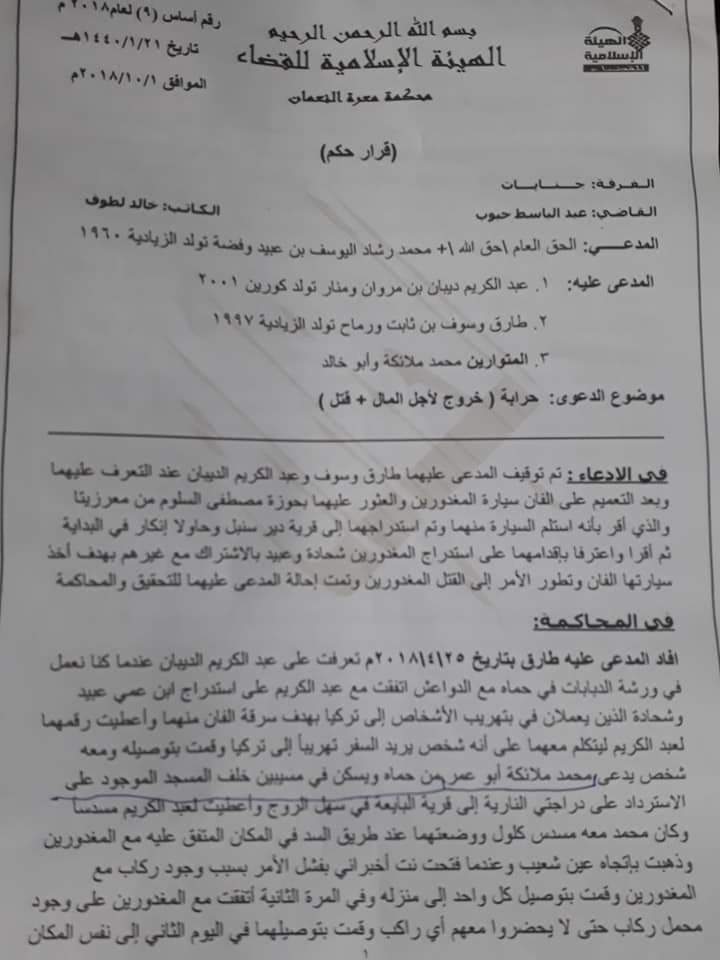
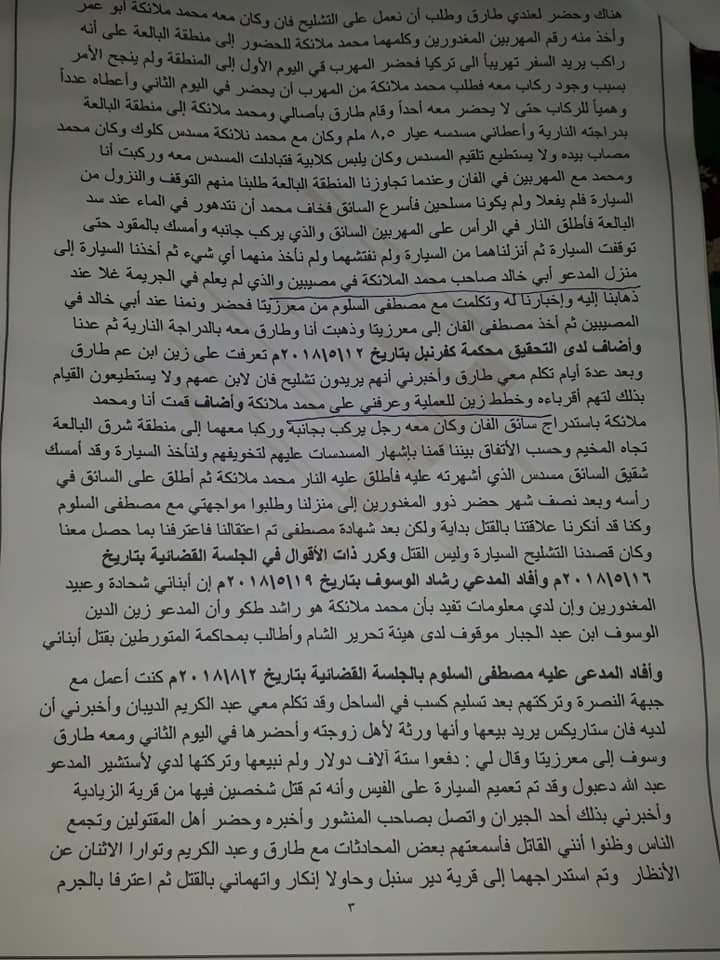
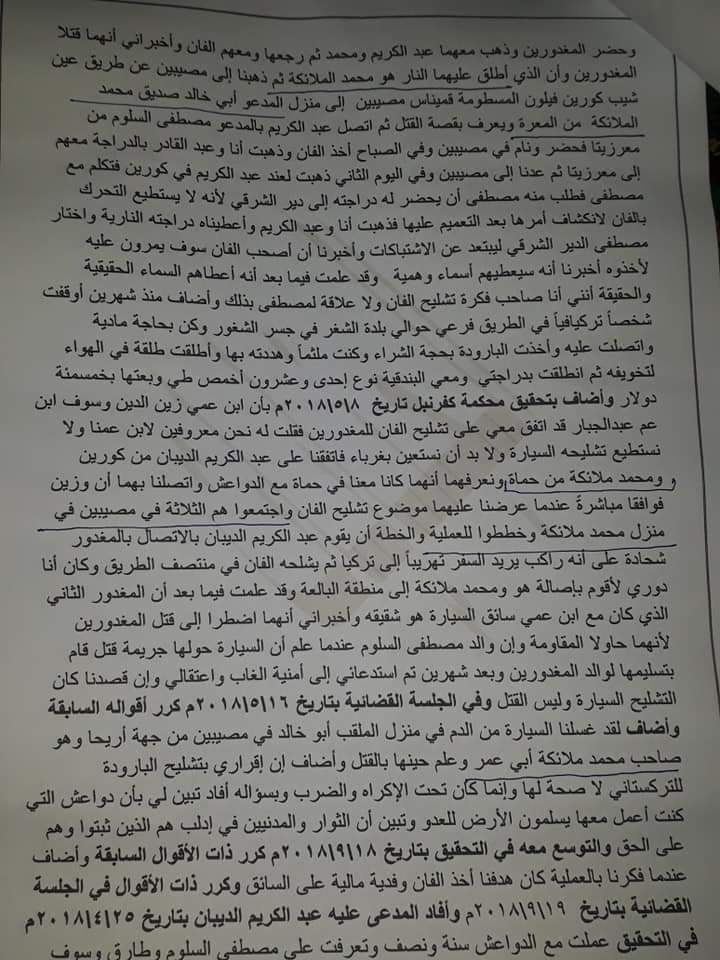
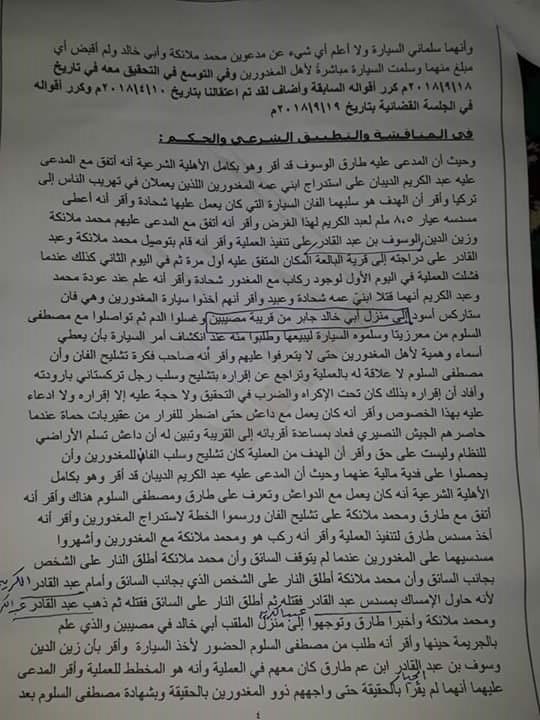
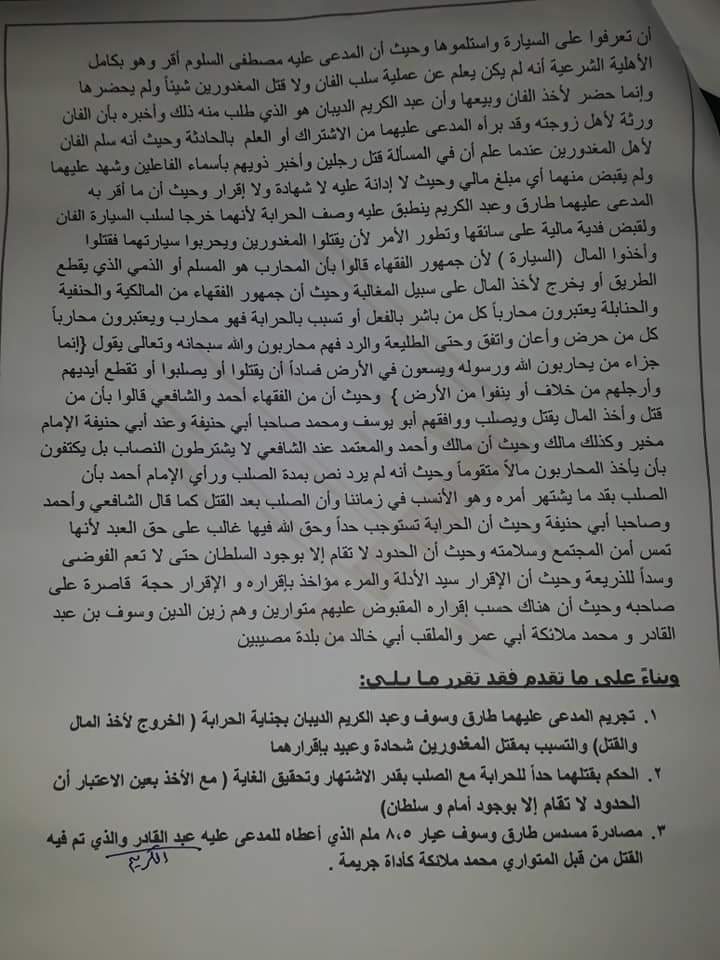
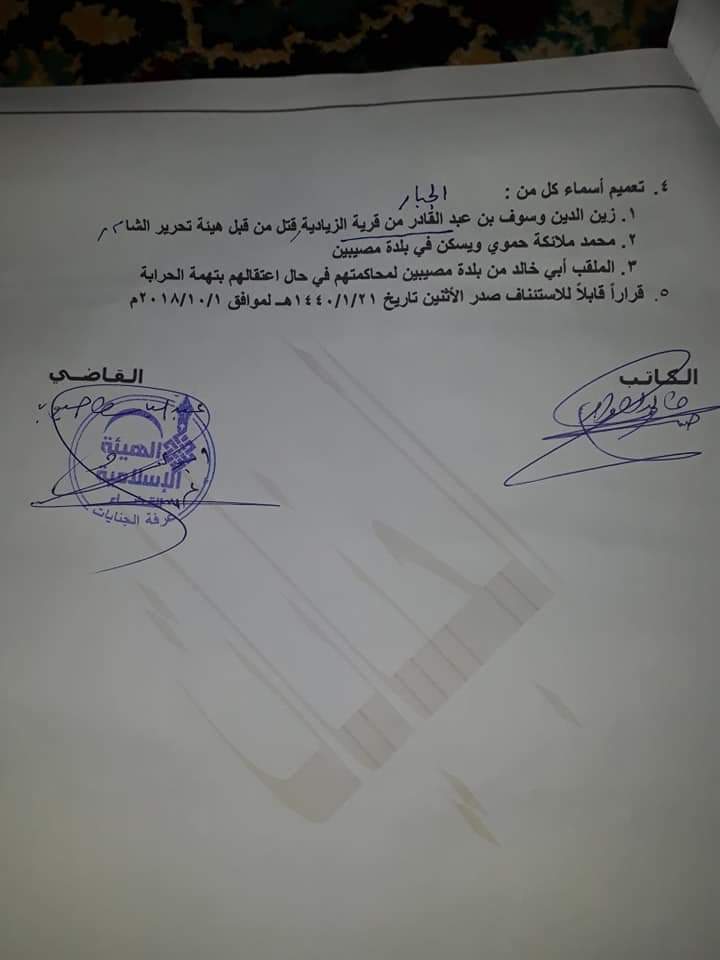
Copy of Obaid and Shuhadeh al-Wassouf murder case’s transcript.

